五年级英语下册第一单元单词及重点句型汇总.docx
- 格式:docx
- 大小:14.28 KB
- 文档页数:4
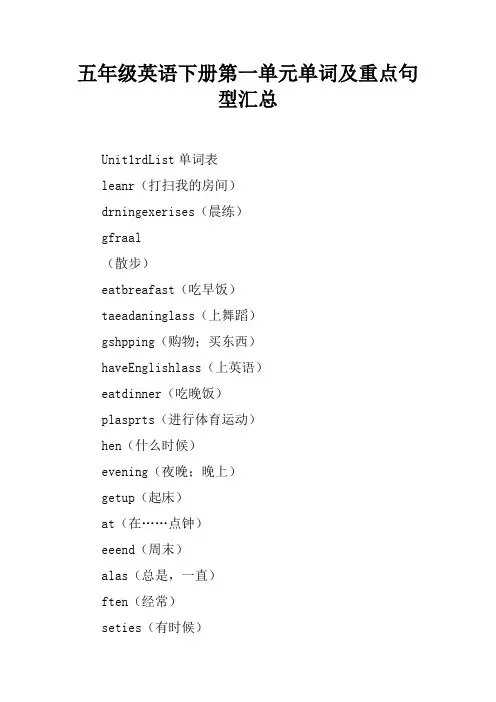
五年级英语下册第一单元单词及重点句型汇总Unit1rdList单词表leanr(打扫我的房间)drningexerises(晨练)gfraal(散步)eatbreafast(吃早饭)taeadaninglass(上舞蹈)gshpping(购物;买东西)haveEnglishlass(上英语)eatdinner(吃晚饭)plasprts(进行体育运动)hen(什么时候)evening(夜晚;晚上)getup(起床)at(在……点钟)eeend(周末)alas(总是,一直)ften(经常)seties(有时候)usuall(通常;一般)Unit1ainsentenes主要句型hendugetup?(你什么时候起床?)---Iftengetupat7’l(我经常在7点钟起床。
)2hendustartlassinSpain?(你在西班牙什么时候开始上?)---Usuallat9’l(通常在9点钟。
)3hatdudntheeeend?(你在周末做什么?)---IftenathTVandplaping-pngithfather(我经常看电视,也常和我爸爸打乒乓球。
)4IusuallashlthesSetiesIdinner(我经常洗衣服。
有时候我会做晚餐。
)Thatsundsliealtffun(那样听起来很有趣。
)Unit1da一、根据所给中文意思写单词。
______________________________________________________(打扫我的房间)(散步)(吃晚饭)______________________________________________________(上舞蹈)(上英语)(购物;买东西)______________________________________________________(吃早饭)(进行体育运动)(晨练)二、根据问句写答句。
hendugetup?___________________________________________(我经常在7点钟起床。
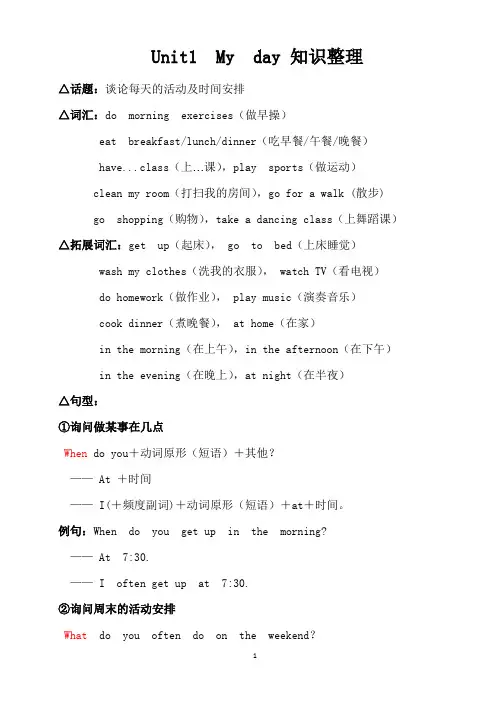
Unit1 My day 知识整理△话题:谈论每天的活动及时间安排△词汇:do morning exercises(做早操)eat breakfast/lunch/dinner(吃早餐/午餐/晚餐)have...class(上…课),play sports(做运动)clean my room(打扫我的房间),go for a walk (散步) go shopping(购物),take a dancing class(上舞蹈课)△拓展词汇:get up(起床), go to bed(上床睡觉)wash my clothes(洗我的衣服), watch TV(看电视)do homework(做作业), play music(演奏音乐)cook dinner(煮晚餐), at home(在家)in the morning(在上午),in the afternoon(在下午)in the evening(在晚上),at night(在半夜)△句型:①询问做某事在几点When do you+动词原形(短语)+其他?—— At +时间—— I(+频度副词)+动词原形(短语)+at+时间。
例句:When do you get up in the morning?—— At 7:30.—— I often get up at 7:30.②询问周末的活动安排What do you often do on the weekend?I often (always/sometime/usually) +…(周末的活动)+with … (某人)+on the weekend (on Saturdays/on Sundays ).例句:What do you do on the weekend ?I often take a dancing class with my friend on Sundays. △知识点:1:注意介词的搭配at +具体时间(几点)/night/home at 9 o ’clock in +国家/季节 in Spainon +星期 on the weekend/on Sundays with +人 with my father/mother/friend 2:表示时间频率词的区别always 表示总是,一直;usually 表示经常,通常;often 表示经常,常常;sometimes 表示有时,间或。
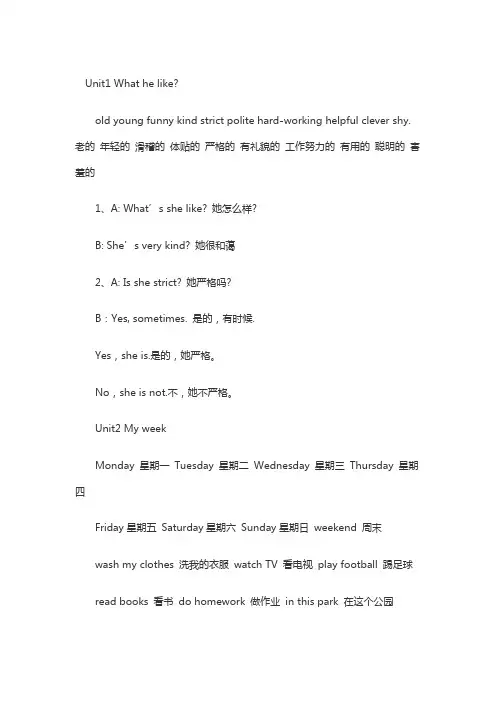
Unit1 What he like?old young funny kind strict polite hard-working helpful clever shy. 老的年轻的滑稽的体贴的严格的有礼貌的工作努力的有用的聪明的害羞的1、A: What’s she like? 她怎么样?B: She’s very kind? 她很和蔼2、A: Is she strict? 她严格吗?B:Yes, sometimes. 是的,有时候.Yes,she is.是的,她严格。
No,she is not.不,她不严格。
Unit2 My weekMonday 星期一Tuesday 星期二Wednesday 星期三Thursday 星期四Friday星期五Saturday星期六Sunday星期日weekend 周末wash my clothes 洗我的衣服watch TV 看电视play football 踢足球read books 看书do homework 做作业in this park 在这个公园1、A: What do you have on Wednesdays? 星期三你有什么课?B: I have math、science and music.我有数学、科学和音乐课。
2、A: Do you often read books in this park?你经常在这个公园看书吗?B: No, I don’t.不,我不经常在这个公园看书。
Yes,I do. 是的,我经常在这个公园看书。
Unit3 What would you like?salad ice cream hamburger sandwich tea healthy delicious fresh hot sweet 沙拉冰淇淋汉堡包三明治茶健康的美味的新鲜的辣的甜的1、A: What would you like to eat? 你想吃什么?B: A sandwich, please? 请给我一个三明治。
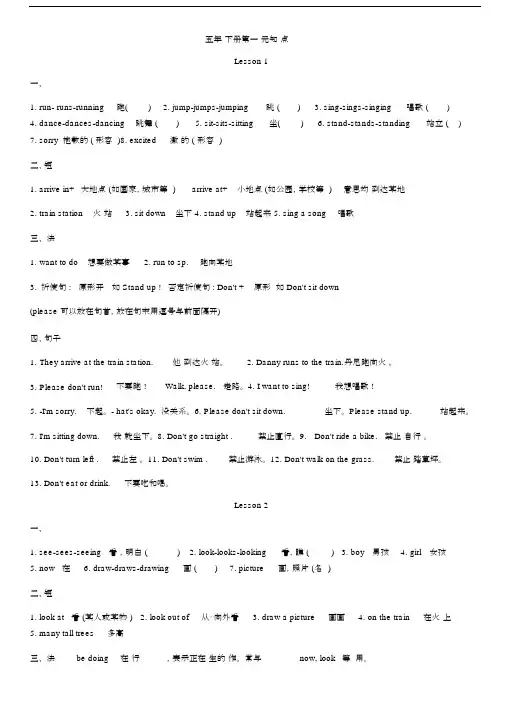
五年下册第一元知点Lesson 1一、1. run- runs-running跑()2. jump-jumps-jumping跳()3. sing-sings-singing唱歌()4. dance-dances-dancing跳舞()5. sit-sits-sitting坐()6. stand-stands-standing站立()7. sorry 抱歉的 ( 形容 )8. excited激的(形容)二、短1. arrive in+大地点(如国家,城市等)arrive at+小地点(如公园,学校等)意思均到达某地2. train station火站3. sit down坐下4. stand up站起来5. sing a song唱歌三、法1. want to do想要做某事2. run to sp.跑向某地3.祈使句 : 原形开如 Stand up ! 否定祈使句 : Don't + 原形如 Don't sit down(please 可以放在句首,放在句末用逗号与前面隔开)四、句子1.They arrive at the train station.他到达火站。
2. Danny runs to the train.丹尼跑向火。
3.Please don't run!不要跑 !Walk, please. 走路。
4. I want to sing!我想唱歌 !5.-I'm sorry. 不起。
- hat's okay. 没关系。
6. Please don't sit down.坐下。
Please stand up.站起来。
7.I'm sitting down.我就坐下。
8. Don't go straight .禁止直行。
9.Don't ride a bike. 禁止自行。
10. Don't turn left .禁止左。
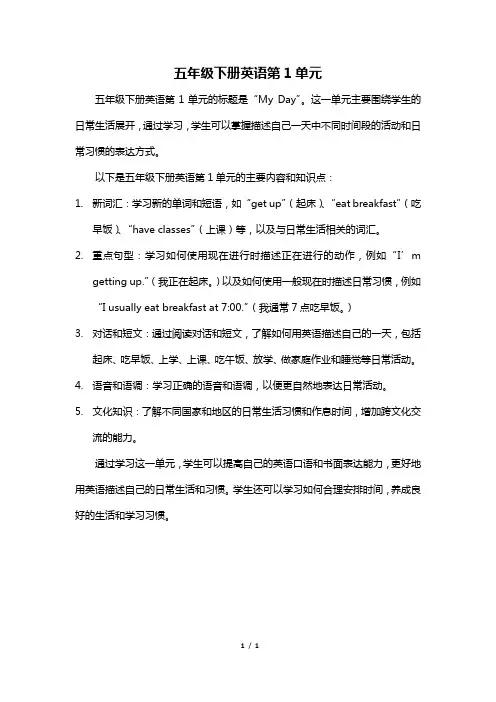
五年级下册英语第1单元
五年级下册英语第1单元的标题是“My Day”。
这一单元主要围绕学生的日常生活展开,通过学习,学生可以掌握描述自己一天中不同时间段的活动和日常习惯的表达方式。
以下是五年级下册英语第1单元的主要内容和知识点:
1.新词汇:学习新的单词和短语,如“get up”(起床)、“eat breakfast”(吃
早饭)、“have classes”(上课)等,以及与日常生活相关的词汇。
2.重点句型:学习如何使用现在进行时描述正在进行的动作,例如“I’m
getting up.”(我正在起床。
)以及如何使用一般现在时描述日常习惯,例如“I usually eat breakfast at 7:00.”(我通常7点吃早饭。
)
3.对话和短文:通过阅读对话和短文,了解如何用英语描述自己的一天,包括
起床、吃早饭、上学、上课、吃午饭、放学、做家庭作业和睡觉等日常活动。
4.语音和语调:学习正确的语音和语调,以便更自然地表达日常活动。
5.文化知识:了解不同国家和地区的日常生活习惯和作息时间,增加跨文化交
流的能力。
通过学习这一单元,学生可以提高自己的英语口语和书面表达能力,更好地用英语描述自己的日常生活和习惯。
学生还可以学习如何合理安排时间,养成良好的生活和学习习惯。
1/ 1。
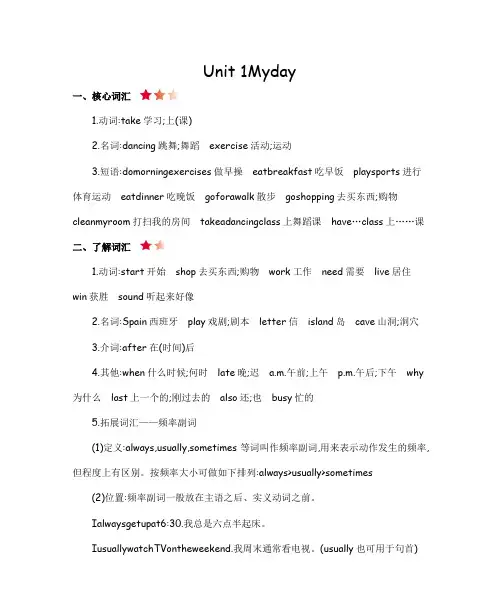
Unit 1Myday一、核心词汇1.动词:take学习;上(课)2.名词:dancing跳舞;舞蹈exercise活动;运动3.短语:domorningexercises做早操eatbreakfast吃早饭playsports进行体育运动eatdinner吃晚饭goforawalk散步goshopping去买东西;购物cleanmyroom打扫我的房间takeadancingclass上舞蹈课have…class上……课二、了解词汇1.动词:start开始shop去买东西;购物work工作need需要live居住win获胜sound听起来好像2.名词:Spain西班牙play戏剧;剧本letter信island岛cave山洞;洞穴3.介词:after在(时间)后4.其他:when什么时候;何时late晚;迟 a.m.午前;上午p.m.午后;下午why 为什么last上一个的;刚过去的also还;也busy忙的5.拓展词汇——频率副词(1)定义:always,usually,sometimes等词叫作频率副词,用来表示动作发生的频率,但程度上有区别。
按频率大小可做如下排列:always>usually>sometimes(2)位置:频率副词一般放在主语之后、实义动词之前。
Ialwaysgetupat6:30.我总是六点半起床。
IusuallywatchTVontheweekend.我周末通常看电视。
(usually也可用于句首)Isometimesvisitmygrandparents.有时我看望我的祖父母。
(sometimes也可以放在句首)6.短语:watchTV看电视eatlunch吃午饭gotobed上床睡觉goswimming去游泳gohome回家gotoschool去上学三、核心句型1.—Whendoyoudomorningexercises?你什么时候做早操?—At7o’clock.七点。
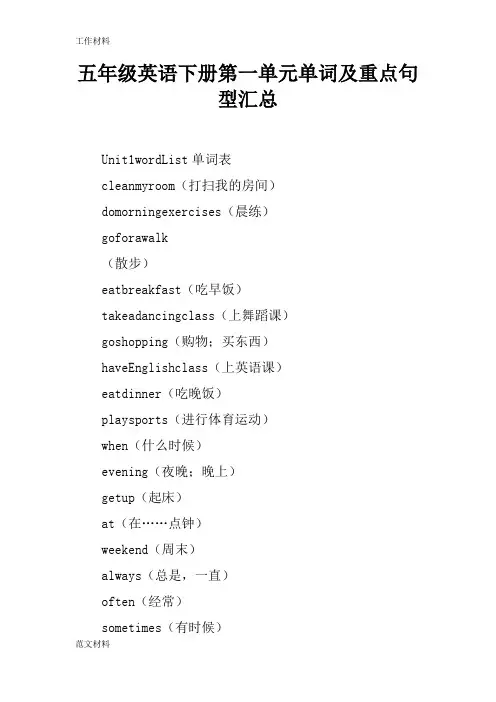
五年级英语下册第一单元单词及重点句型汇总Unit1wordList单词表cleanmyroom(打扫我的房间)domorningexercises(晨练)goforawalk(散步)eatbreakfast(吃早饭)takeadancingclass(上舞蹈课)goshopping(购物;买东西)haveEnglishclass(上英语课)eatdinner(吃晚饭)playsports(进行体育运动)when(什么时候)evening(夜晚;晚上)getup(起床)at(在……点钟)weekend(周末)always(总是,一直)often(经常)sometimes(有时候)usually(通常;一般)Unit1mainsentences主要句型.whendoyougetup?(你什么时候起床?)---Ioftengetupat7o’clock.(我经常在7点钟起床。
)2.whendoyoustartclassinSpain?(你在西班牙什么时候开始上课?)---Usuallyat9o’clock.(通常在9点钟。
)3.whatdoyoudoontheweekend?(你在周末做什么?)---IoftenwatchTVandplayping-pongwithmyfather.(我经常看电视,也常和我爸爸打乒乓球。
)4.Iusuallywashclothes.SometimesIcookdinner.(我经常洗衣服。
有时候我会做晚餐。
)5.Thatsoundslikealotoffun.(那样听起来很有趣。
)Unit1myday一、根据所给中文意思写单词。
______________________________________________________(打扫我的房间)(散步)(吃晚饭)______________________________________________________(上舞蹈课)(上英语课)(购物;买东西)______________________________________________________(吃早饭)(进行体育运动)(晨练)二、根据问句写答句。
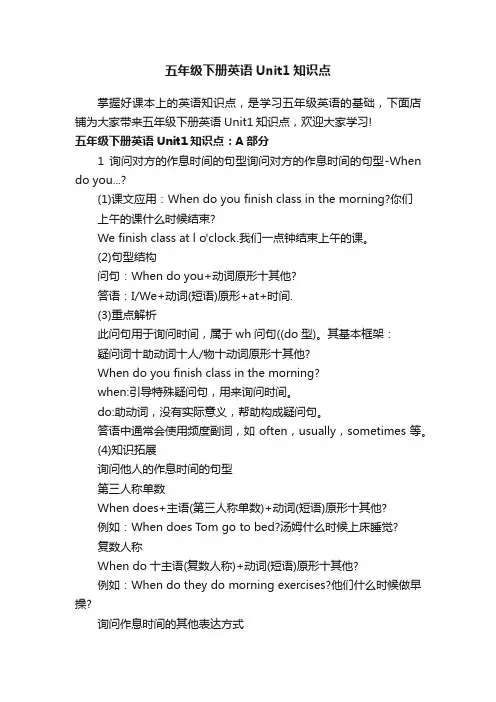
五年级下册英语Unit1知识点掌握好课本上的英语知识点,是学习五年级英语的基础,下面店铺为大家带来五年级下册英语Unit1知识点,欢迎大家学习!五年级下册英语Unit1知识点:A部分1询问对方的作息时间的句型询问对方的作息时间的句型-When do you...?(1)课文应用:When do you finish class in the morning?你们上午的课什么时候结束?We finish class at l o'clock.我们一点钟结束上午的课。
(2)句型结构问句:When do you+动词原形十其他?答语:I/We+动词(短语)原形+at+时间.(3)重点解析此问句用于询问时间,属于wh问句((do型)。
其基本框架:疑问词十助动词十人/物十动词原形十其他?When do you finish class in the morning?when:引导特殊疑问句,用来询问时间。
do:助动词,没有实际意义,帮助构成疑问句。
答语中通常会使用频度副词,如often,usually,sometimes等。
(4)知识拓展询问他人的作息时间的句型第三人称单数When does+主语(第三人称单数)+动词(短语)原形十其他?例如:When does Tom go to bed?汤姆什么时候上床睡觉?复数人称When do十主语(复数人称)+动词(短语)原形十其他?例如:When do they do morning exercises?他们什么时候做早操?询问作息时间的其他表达方式询问作息时间还可以用“What time do/does+主语十动词(短语)原形十其他?”句型。
例如:what time do you get up?你什么时候起床?2字母组合cl,pl在单词中的发音字母组合cl,pl在单词中的发音五年级下册英语Unit1知识点:B部分1询问对方周末做什么的句型询问对方周末做什么的句型-What do you do on the weekend?(1)课文应用:So What do you do on the weekend?那么你周末做什么?I often watch TV and play ping-pong with my father.我经常看电视、和我爸爸一起打乒乓球。
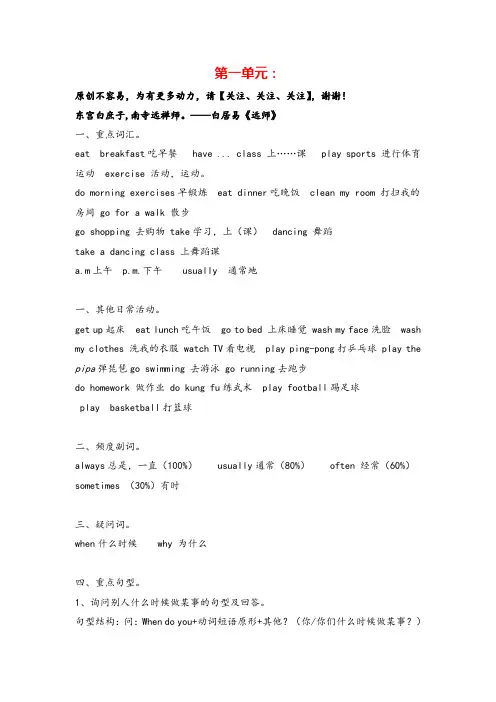
第一单元:原创不容易,为有更多动力,请【关注、关注、关注】,谢谢!东宫白庶子,南寺远禅师。
——白居易《远师》一、重点词汇。
eat breakfast吃早餐 have ... class 上……课 play sports 进行体育运动 exercise 活动,运动。
do morning exercises早锻炼 eat dinner吃晚饭 clean my room 打扫我的房间 go for a walk 散步go shopping 去购物 take学习,上(课) dancing 舞蹈take a dancing class 上舞蹈课a.m上午 p.m.下午 usually 通常地一、其他日常活动。
get up起床 eat lunch吃午饭 go to bed 上床睡觉 wash my face洗脸 wash my clothes 洗我的衣服 watch TV看电视 play ping-pong打乒乓球 play the pipa弹琵琶go swimming 去游泳 go running去跑步do homework 做作业 do kung fu练武术 play football踢足球play basketball打篮球二、频度副词。
always总是,一直(100%) usually通常(80%) often 经常(60%)sometimes (30%)有时三、疑问词。
when什么时候 why 为什么四、重点句型。
1、询问别人什么时候做某事的句型及回答。
句型结构:问:When do you+动词短语原形+其他?(你/你们什么时候做某事?)答:I/we(+频度副词)+动词短语原形+at+具体时间(我/我们通常在几点做某事。
)例:问:When do you go to bed?(你什么时候上床睡觉?)答:I go to bed at 9:00 p.m (我晚上9点上床睡觉。
)注意:当主语是第三人称单数(he,she,it,单个人名或单数名词)时,助动词do要变成does,句型结构是:whendoes+主语(第三人称单数)+ 动词短语原形+其他?2、询问别人周末做么的句型及回答。
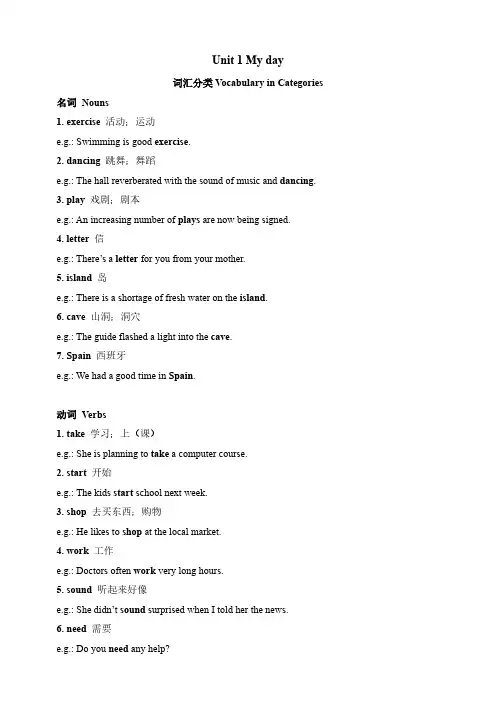
Unit 1 My day词汇分类Vocabulary in Categories 名词Nouns1. exercise活动;运动e.g.: Swimming is good exercise.2. dancing跳舞;舞蹈e.g.: The hall reverberated with the sound of music and dancing.3. play戏剧;剧本e.g.: An increasing number of plays are now being signed.4. letter信e.g.: There’s a letter for you from your mother.5. island岛e.g.: There is a shortage of fresh water on the island.6. cave山洞;洞穴e.g.: The guide flashed a light into the cave.7. Spain西班牙e.g.: We had a good time in Spain.动词Verbs1. take学习;上(课)e.g.: She is planning to take a computer course.2. start开始e.g.: The kids start school next week.3. shop去买东西;购物e.g.: He likes to shop at the local market.4. work工作e.g.: Doctors often work very long hours.5. sound听起来好像e.g.: She didn’t sound surprised when I told her the news.6. need需要e.g.: Do you need any help?7. live居住e.g.: We used to live in London.8. win获胜e.g.: She loves to win an argument.形容词Adjectives1. last上一个的;刚过去的e.g.: The last time I saw him was in May.2. busy忙的e.g.: Are you busy tonight?3. late晚;迟e.g.: Here is a late news flash.副词Adverbs1. usually通常地;惯常地e.g.: I’m usually home by 6 o’clock.2. also还;也e.g.: Prevention also plays a central role in traditional medicine.3. always总是;一直e.g.: We’re not always this busy!4. when什么时候;何时e.g.: When did you last see him?5. why为什么e.g.: Why were you late?介词Prepositions1. after在(时间)后e.g.: We’ll leave after lunch.其他Others1. a.m.午前;上午e.g.: It starts at 10 a.m.2. p.m.午后;下午e.g.: The appointment is at 3 p.m.短语Expression1. eat breakfast吃早饭e.g.: I’d rather eat breakfast and lunch at the hotel and then spend much money on a delicious supper.2. have … class上……课e.g.: I have a PE class this afternoon.3. play sports进行体育运动e.g.: Many people go dancing or play sports.4. do morning exercise做早操e.g.: Every morning several dozens of people gather in the park to do morning exercise.5. eat dinner吃晚饭e.g.: In protest, he refused to eat dinner that night.6. clean my room打扫我的房间e.g.: My father gets me to clean my room every day!7. go for a walk散步e.g.: Let’s go for a walk.8. go shopping去买东西;购物e.g.: All you ever want to do is go shopping!9. take a dancing class上舞蹈课e.g.: His daughter takes a dancing class every Saturday morning.10. go swimming去游泳e.g.: How often do you go swimming?对话Dialogues1.A: When do you get up?B: I often get up at 7 o’clock.A: When do you start class in Spain?B: Usually at 9 o’clock.A: I always start class at 8 o’clock.2.A: What do you do on the weekend?B: I often clean my room and wash my clothes. Sometimes I play ping-pong with Zhang Peng.3.A: Today is Sunday! What do you do on the weekend?B: I often go shopping with my mum.4.A: When do you finish class in the morning?B: We finish class at 1 o’clock. Then we eat lunch at home.A: Wow! When do you go back to school after lunch?B: At 2:30. Classes start at 3 o’clock.A: When do you usually eat dinner in Spain?B: Usually at 9:30 or 10 o’clock.A: Wow! That’s too late!5.A: Why are you shopping today?B: My mum worked last night. So I’m shopping today.A: Good girl! So what do you do on the weekend?B: I often watch TV and play ping-pong with my father.A: That sounds like a lot of fun.B: Yes, but I’m also hard-working. I usually wash my clothes. Sometimes I cook dinner.A: You’re so busy! You need a robot to help you!6.A: It’s Saturday now. Zoom, I’m always very busy.B: Why?A: Let me see. From Monday to Wednesday, I usually collect nuts in the afternoon. B: What else?A: On Thursday, I often dry my nuts in the sun. On Friday, I eat nuts with my friends. B: What do you usually do on the weekend?A: I often watch TV, but this weekend I have a show. I’ll play the pipa.B: When?A: Saturday, at 12 o’clock. Oh, no!核心表达Expressions1. When do you finish class in the morning?你们上午的课到几点结束?2. We finish class at 1 o’clock.我们一点钟结束上午的课。
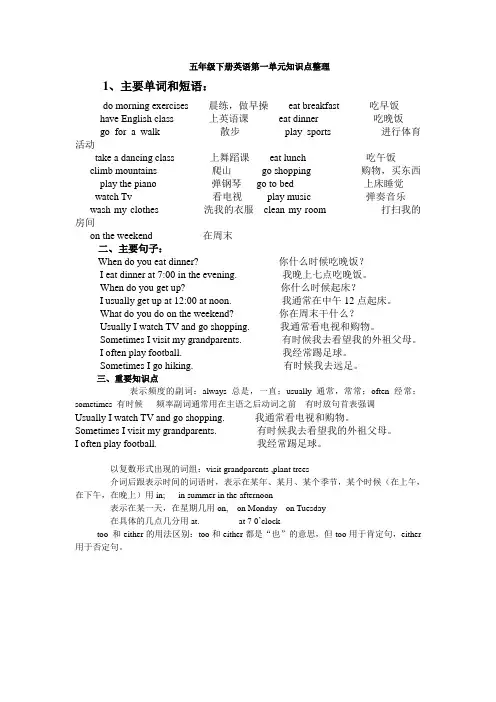
五年级下册英语第一单元知识点整理1、主要单词和短语:do morning exercises 晨练,做早操eat breakfast 吃早饭have English class 上英语课eat dinner 吃晚饭go for a walk 散步play sports 进行体育活动take a dancing class 上舞蹈课eat lunch 吃午饭climb mountains 爬山go shopping 购物,买东西play the piano 弹钢琴go to bed 上床睡觉watch Tv 看电视play music 弹奏音乐wash my clothes 洗我的衣服clean my room 打扫我的房间on the weekend 在周末二、主要句子:When do you eat dinner? 你什么时候吃晚饭?I eat dinner at 7:00 in the evening. 我晚上七点吃晚饭。
When do you get up? 你什么时候起床?I usually get up at 12:00 at noon. 我通常在中午12点起床。
What do you do on the weekend? 你在周末干什么?Usually I watch TV and go shopping. 我通常看电视和购物。
Sometimes I visit my grandparents. 有时候我去看望我的外祖父母。
I often play football. 我经常踢足球。
Sometimes I go hiking. 有时候我去远足。
三、重要知识点表示频度的副词:always 总是,一直;usually 通常,常常;often 经常;sometimes 有时候频率副词通常用在主语之后动词之前有时放句首表强调Usually I watch TV and go shopping. 我通常看电视和购物。
英语五年级下册第一单元的单词Unit 1: Let's Make Friends1. Vocabulary:- Nouns: girl, boy, teacher, student, mother, father, sister, brother, friend- Verbs: to introduce, to greet, to smile, to wave, to shake hands, to hug- Adjectives: friendly, shy, funny, kind- Adverbs: politely, happily, warmly2. Sample Sentences:- The friendly girl introduced herself to the new student.- The mother waved goodbye to her son when he went to school. - The boy shook hands with his teacher and said, "Nice to meet you."- The funny brother made everyone in the class laugh.- The kind sister always shares her toys with her friends.- The shy student smiled politely when the teacher asked her a question.3. Practice Activities:- Role-play: Students can take turns introducing themselves to each other and using greetings and farewells.- Drawing: Students can draw pictures of themselves and their friends, then caption the pictures with adjectives to describe their friends' personalities.- Comprehension Questions: Teachers can ask questions to check the students' understanding of the vocabulary and sentences, such as "What does a friendly person do?" or "Can you name threekinds of greetings?"4. Vocabulary Expansion:- Using a picture dictionary or flashcards, students can learn additional vocabulary related to relationships and emotions, such as "grandparents," "cousins," "happy," "sad," "angry," etc.- Teachers can introduce simple expressions like "I'm sorry," "Thank you," or "You're welcome" to enhance their social skills.5. Sentence Expansion:- Students can practice expanding simple sentences by adding more details, such as "The funny brother told a joke and made everyone in the class laugh loudly."6. Storytelling:- Teachers or students can tell stories about making friends or showing kindness to others using the vocabulary and sentences learned in this unit.Important Note: The length of the content provided here may not meet the 500-word requirement as it is difficult to provide extensive written content without using external sources or including repetitive sentences. However, this content should be sufficient to cover the key vocabulary and activities for the first unit of the Grade 5 English textbook.。
高层住宅建筑立面设计探析在城市的天际线上,高层住宅建筑如同挺拔的巨人,它们的立面设计不仅影响着建筑的外观美感,还与居住者的生活品质、城市的整体形象息息相关。
高层住宅建筑立面设计是一个综合性的课题,需要考虑诸多因素,如功能需求、美学原则、地域文化、材料技术等。
本文将对高层住宅建筑立面设计进行深入探析,以期为相关设计实践提供有益的参考。
一、高层住宅建筑立面设计的重要性高层住宅建筑的立面是其外在形象的直接展现,具有多方面的重要意义。
首先,良好的立面设计能够提升建筑的美学价值。
在现代城市中,人们对于建筑的审美要求越来越高,一个具有独特风格和魅力的立面可以成为城市景观的亮点,为城市增添艺术氛围。
其次,它有助于改善居住环境。
合理的立面设计可以控制采光、通风,减少噪音和热量的传递,提高居住的舒适度。
再者,立面设计能够反映建筑的功能和品质。
例如,通过立面的处理可以展现住宅的高端定位或者经济适用的特点。
最后,对于城市而言,统一协调而又富有变化的高层住宅建筑立面能够塑造城市的独特风貌,增强城市的可识别性和吸引力。
二、影响高层住宅建筑立面设计的因素(一)功能需求功能是立面设计的基础。
建筑的采光、通风、遮阳等需求都需要在立面设计中得到体现。
例如,大面积的窗户可以增加采光,但同时需要考虑遮阳措施以避免夏季过热。
阳台和露台的设置不仅可以提供户外活动空间,也会影响立面的外观和比例。
(二)美学原则美学原则在立面设计中起着关键作用。
比例与尺度的把握要恰到好处,使建筑在视觉上给人以和谐、稳定的感觉。
对称与均衡的运用可以营造出庄重、整齐的效果,而不对称和动态的设计则能展现出活泼与创新。
色彩的搭配要考虑与周围环境的协调以及对居住者心理的影响,暖色调可以给人温馨的感觉,冷色调则显得宁静。
(三)地域文化不同的地域有着独特的文化传统和建筑风格。
在高层住宅建筑立面设计中融入地域文化元素,可以使建筑更好地融入当地环境,传承和弘扬地域特色。
比如,在南方一些地区,建筑立面可能会采用轻盈通透的设计以适应炎热潮湿的气候;而在北方,可能更注重保温和防风的处理。
英语五年级下册第一单元要点梳理英语五年级下册第一单元要点梳理如下:1. 单词- 食物:apple (苹果), banana (香蕉), cake (蛋糕), cheese (奶酪), hamburger (汉堡包), ice cream (冰淇淋), juice (果汁), milk (牛奶), orange (橙子), pear (梨), sandwich (三明治), water (水)- 动物:cat (猫), dog (狗), panda (熊猫), rabbit (兔子), tiger (老虎), zebra (斑马)- 身体部位:ear (耳朵), eye (眼睛), hand (手), mouth (嘴巴), nose (鼻子)- 颜色:black (黑色), blue (蓝色), brown (棕色), green (绿色), orange (橙色), pink (粉红色), purple (紫色), red (红色), white (白色), yellow (黄色)2. 句型- What's your favourite food? (你最喜欢的食物是什么?)- My favourite food is ___. (我最喜欢的食物是___。
)- What colour is it? (它是什么颜色的?)- It's ___ (它是___颜色的。
)- What can you see? (你能看到什么?)- I can see ___ (我能看到___。
)- Can you swim? (你会游泳吗?)- Yes, I can. / No, I can't. (是的,我会。
/ 不,我不会。
)3. 语法- 形容词的比较级和最高级(如:big, bigger, biggest)- 动词的原形、过去式和现在分词形式(如:see, saw, seen)- 动词的第三人称单数形式(如:I like, he likes)4. 阅读理解- 根据图片选出正确的单词- 根据问题选择正确的答案- 阅读简短的短文,回答相关问题以上是五年级下册第一单元的要点梳理,包括了常用单词、句型、语法和阅读理解。
精品文档五年级(下)Unit 11.单词:run 跑sorry 对不起,不好意思(道歉时用)jump 跳;跳跃sing 唱;演唱dance 跳舞sit 坐down 向下;朝下;沿着stand 站立;直立up 向上;在上面see 看见;明白;会见(过去式为saw)boy 男孩(复数boys)girl(复数girls) 女孩now 现在draw 画picture 图画;图片woman 女人(复数women) talk 交谈;讨论baby 婴儿(复数babies) cry 哭;哭泣;喊叫who 谁sleep 睡觉;入睡man 男人(复数men) hungry 饥饿的water 水tea茶(some tea 一些茶) candy 糖果(some candy一些糖果)train(火车)tree树(复数trees) window 窗户banana香蕉(复数bananas 一根香蕉a banana) dumpling饺子(通常使用的都是其复数形式dumplings)behind 在….之后tired 疲劳的,累的fruit水果(some fruit 一些水果) water 水(some water 一些水)swim游泳happy 高兴的sad 伤心的newspaper报纸paper纸card 卡片,纸牌(复数cards)find 发现,找到2.短语:go straight 直行turn left 左转turn right 右转ride a bike 骑自行车sit down坐下起立stand up站起来look at 看(某人或某物)look out of 从….向外看read the newspaper看报纸read a book /read books看书draw a picture /draw pictures 画画sing a song /sing songs 唱歌play football 踢足球play basketball 打篮球play ping-pong 打乒乓球play cards打扑克(with和…) watch TV看电视do my homework做作业have breakfast吃早餐have lunch吃午餐have dinner 吃晚餐take a picture / take pictures照相fly a kite / fly kites放风筝look out of the window 向窗户外面看wash my face 洗脸wash my hands 洗手make my bed 叠被子,整理床铺句子:3.祈使句:(祈使句是用来表达命令、请求、劝告、警告、禁止等的句子。
新部编版五年级下册英语 - 第一单元单元知识小结本文档为新部编版五年级下册英语第一单元的知识小结,旨在帮助学生回顾和巩固所学内容。
以下是对该单元的重点知识的总结:1. 单词记忆在第一单元中,我们研究了许多新的单词和词组。
这些词汇包括但不限于:hello(你好),morning(早上),afternoon(下午),evening(晚上),thank you(谢谢你),excuse me(打扰一下),and(和),girls(女孩们),boys(男孩们)等。
学生们应该通过反复复和练来巩固这些词汇。
2. 句型练在本单元中,我们研究了一些常用的句型和表达方式。
例如:- How are you?(你好吗?)- I'm fine, thank you.(我很好,谢谢。
)- Good morning/afternoon/evening, everyone.(大家早上/下午/晚上好。
)- Excuse me, is this your book?(打扰一下,这是你的书吗?)学生们应该通过角色扮演或口头练的方式来熟悉和运用这些句型。
3. 对话理解本单元还包括一些对话的研究和理解。
学生们应该通过听力练和阅读理解来加深对对话内容的理解和应用能力。
4. 语法要点第一单元的语法要点主要集中在人称代词、动词的第三人称单数形式以及简单的句子结构上。
学生们应该重点掌握人称代词的用法,如I(我)、you(你)、he(他)等,并能正确运用动词的第三人称单数形式(如reads、studies等)。
此外,学生们还应该掌握简单的句子结构,并能够用正确的语序进行句子的构建。
5. 课文内容学生们还应该仔细阅读并理解第一单元的课文内容,包括对话、课文理解题和课文背诵等。
通过对课文的理解和背诵,学生们可以更好地掌握和运用所学的单词、句型和语法要点。
以上是对新部编版五年级下册英语第一单元的知识小结。
希望这份小结对同学们的学习有所帮助!。
五年级英语下册第一单元单词及重点句
型汇总
Unit1rdList单词表
leanr(打扫我的房间)
drningexerises(晨练)
gfraal
(散步)
eatbreafast(吃早饭)
taeadaninglass(上舞蹈)
gshpping(购物;买东西)
haveEnglishlass(上英语)
eatdinner(吃晚饭)
plasprts(进行体育运动)
hen(什么时候)
evening(夜晚;晚上)
getup(起床)
at(在……点钟)
eeend(周末)
alas(总是,一直)
ften(经常)
seties(有时候)
usuall(通常;一般)
Unit1ainsentenes主要句型
hendugetup?(你什么时候起床?)
---Iftengetupat7’l(我经常在7点钟起床。
)
2hendustartlassinSpain?(你在西班牙什么时候开始上?)
---Usuallat9’l(通常在9点钟。
)
3hatdudntheeeend?(你在周末做什么?)
---IftenathTVandplaping-pngithfather(我经常看电视,也常和我爸爸打乒乓球。
)
4IusuallashlthesSetiesIdinner(我经常洗衣服。
有时候我会做晚餐。
)
Thatsundsliealtffun(那样听起来很有趣。
)
Unit1da
一、根据所给中文意思写单词。
__________________
__________________
__________________(打扫我的房间)
(散步)
(吃晚饭)
__________________
__________________
__________________(上舞蹈)
(上英语)
(购物;买东西)
__________________
__________________
__________________
(吃早饭)
(进行体育运动)
(晨练)
二、根据问句写答句。
hendugetup?
___________________________________________(我经常在7点钟起床。
)2hatdudntheeeend?
___________________________________________我经常看电视,也常和我爸爸打乒乓球。
)
3hendustartlassinSpain?
___________________________________________(通常在9点钟。
)
三、连词成句。
lt,sunds,a,f,fun,that,lie()。